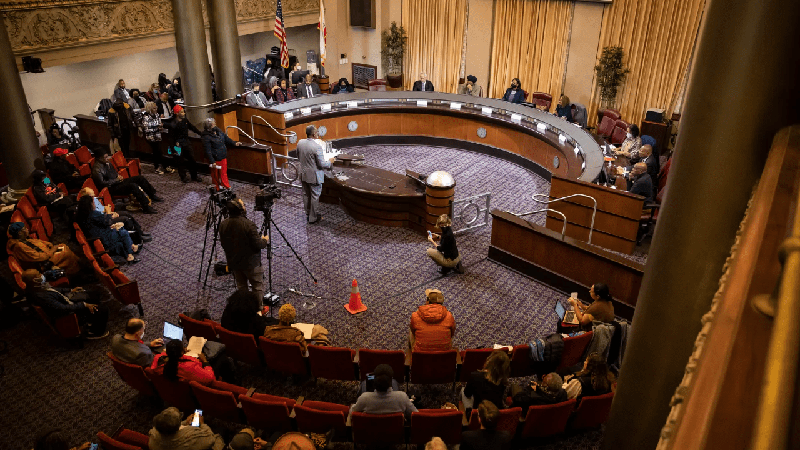Task force members discuss monetary reparations to compensate for slavery and racism, as well as policies to prevent future harms against Black Californians.

The AB 3121 Task Force to Study and Develop Reparations Proposals for African Americans meets in Oakland on Dec. 14, 2022. Photo by Martin do Nascimento, CalMatters
BY WENDY FRY
End legalized slavery in California. Adopt a Black studies school curriculum that shows racism’s devastating results. Stop devaluing Black businesses.
These are some of the dozens of recommendations California’s first-in-the-nation task force on reparations put into its 485-page interim report. Members say these policy recommendations are not getting the attention that monetary discussions are, even though these policy ideas might have as big an impact.
“This is the meat — the actual meat — of what we’re really trying to do,” said Assemblymember Reggie Jones-Sawyer, a Democrat representing Los Angeles who also is a task force member.
“And ultimately … 99% of these recommendations will be the ones, probably, that we’ll be able to enact or to budget for a lot easier than compensation. In fact, reparations is not just financial compensation, but it’s to stop the ongoing harms of racial chattel slavery.”
The Reparations Task Force is helping state officials examine how slavery and systemic racism have harmed African Americans, and how the state should respond. Gov. Gavin Newsom signed the 2020 law creating the task force, which will develop reparations proposals for the Legislature by July 2023.
The state-appointed group of nine experts and lawmakers is holding its next public meetings at San Diego State University Friday and Saturday.
Wealth Disparity
About 6.5% of California residents, more than 2.5 million people, identify as Black or African American.
At a meeting in March 2022, the task force voted that Black Californians who are descendants of enslaved African Americans, or of a free Black person living in the United States prior to the end of the 19th century, would be eligible for monetary reparations.
After later meetings, news coverage sometimes focused on the dollar figures behind potential task force recommendations, such as the $223,000 Black “housing wealth gap” estimate that was suggested as part of reparations for housing discrimination.
Economists told the task force that Black homeowners were unfairly denied mortgages and their properties were devalued. Studying the years 1933 through 1977, the economists calculated that the average Black Californian’s home was worth a total of $223,239 — or $5,074 per year — less than the average Californian’s home.
Since then some task force members have tried redirecting public attention to the non-monetary recommendations in the task force report. Kamilah Moore, who heads the task force, said during a meeting in Oakland last month that all dollar figures under discussion were preliminary and no official recommendations have been made.
Reversing Harm
Jones-Sawyer pointed to several policy goals of the task force, such as preventing Black health disparities, stopping the over-incarceration of African American males and bridging gaps in the education system.
“And that’s just the tip of the iceberg of what we could do to reverse the harms of chattel slavery and what reparations really should be,” he said. “The things I just named, the things we can turn around, will last for the next 400 years and really impact our community in a positive way.”
One key recommendation, Jones-Sawyer said, is something few Californians are aware of — the wording in California’s Constitution allows for slavery.
“Today! In 2023,” he said.
Article 1, Section 6 of the state Constitution outlaws slavery and involuntary servitude “except as a punishment for crime whereof the party shall have been duly convicted.”
“More embarrassing is that the California Legislative Black Caucus tried to remove it out of the Constitution and we couldn’t get it through,” he said. “The state Senate couldn’t get enough votes to get it out of the Constitution. But that also tells you how people’s misunderstanding of ongoing racism is still there.”
The California Department of Finance opposed the bill, estimating in June 2022 that it would cost California $1.5 billion to pay prisoners a minimum wage.
The task force may add its recommendation to the Black Caucus’ push to remove that language, Jones-Sawyer said.
Read more ‘California Reparations Task Force Seeks More Than Dollars’ on CalMatters.
CalMatters.org is a nonprofit, nonpartisan media venture explaining California policies and politics.
Articles which extol the virtues of a report or article put out by a local newsroom.